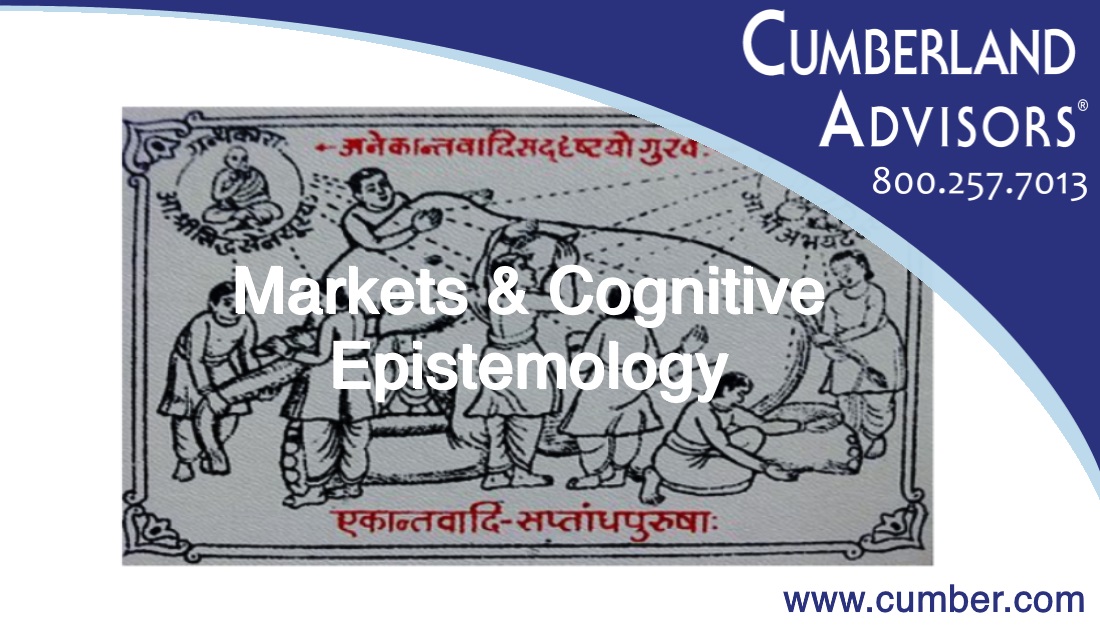We want to open a discussion about cognitive epistemology, invoking behavioral economics and translating our conclusions into a market strategy at the end.

Epistemology is the study of how we know what we know – or really, what we think we know. Here is a precise definition: “the theory of knowledge, especially with regard to its methods, validity, and scope. Epistemology is the investigation of what distinguishes justified belief from opinion.”
Cognition is a nuanced subject. We’re influenced by our five basic senses (sight, hearing, touch, taste, smell). That is how perceiving begins.
Our brains process our perceptions into sensations and emotions and generate instinctual and intuitive, rational and irrational responses to all sorts of things. That is, we form cognitions, and they alter our behavior, sometimes guiding us to act in productive ways and other times leading us to act in ways we subsequently regret.
A skilled writer, Carole Klein wrote Overcoming Regret: Lessons from the Road Not Taken (https://www.amazon.com/Overcoming-Regret-Lessons-Carole-Klein/dp/0553089250/). I was privileged to discuss the subject with her before she died. She explained eloquently how regret is an emotion we experience after something unfortunate happens. But regret, however unpleasant, can help us to avoid repeating our mistakes if we remember accurately and reason constructively about our experience.
But therein lies another variable in the cognitive epistemology equation. How well do we remember what we experience? Isn’t our sometimes faulty memory part of the issue when it comes to determining what we really know? As a researcher and writer, I think the answer is yes. As we study questions of cognitive epistemology more deeply, we are likely to become less and less sure of our views. Are we victims of our own cognitive epistemological deficiencies? That question, too, must probably be answered with a yes if we are honest with ourselves.
We will link readers to the famous Daniel Kahneman lecture on “The Riddle of Experience vs. Memory”: https://www.ted.com/talks/daniel_kahneman_the_riddle_of_experience_vs_memory?language=en.
And here is another famous lecture on memory, by Elizabeth Loftus: https://www.ted.com/talks/elizabeth_loftus_the_fiction_of_memory/transcript.
So how should investors deal with this issue? And what do we do with the information flows in our present, emotionally charged political economy?
Here’s a case study.
I sat at dinner with a friend who is an avid Trump supporter. He defends Trump on most political issues, and he notes that Trump seems to be doing better and behaving in a more presidential manner lately. He and I then discussed climate change and the intensification of Hurricane Michael as it passed over very warm Caribbean and Gulf of Mexico water.
Sitting across the table was a harsh Trump critic. The critic’s list of issues was long and thorough. These two friends argued robustly but politely. There was mutual respect to go along with their strong opinions. Both agreed with me that it has become increasingly difficult to hold discussions of political issues in social settings.
We’re struck by how intensely the nation seems to be divided and we now offer readers two pieces to contemplate. Here is Devin Stewart on “Trump and the End of Smugness,” including an interesting section titled Bursting the “Cognitive Bubble”: https://warontherocks.com/2018/10/trump-and-the-end-of-smugness/. Trump supporters may find a surprise or two as they read this. And here is an analysis from Psychology Today entitled “The Dunning-Kruger Effect May Help Explain Trump's Support”: https://www.psychologytoday.com/us/blog/mind-in-the-machine/201808/the-dunning-kruger-effect-may-help-explain-trumps-support.
I suspect this juxtaposition will intensify the divide.
For market agents this array of opinion on epistemological issues relating to the political economy challenges us. It certainly does me. The questions of cognitive epistemology are profound.
Meanwhile we see the quarterly earnings season unfold while we watch the Fed shrink its balance sheet and concomitantly raise its policy interest rate, trying to successfully do two challenging things at once. We also note the upward revision of federal deficit estimates.
My memory turns up no historical references for the current array of challenges. I’m trying to be careful about what I know and not allow emotions to deceive me.
We are maintaining a cash reserve. We favor sectors that seem buffered in the trade war, such as defense and domestic energy. Of course, we may make changes at any time.
David R. Kotok
Chairman and Chief Investment Officer
Email | Bio
Links to other websites or electronic media controlled or offered by Third-Parties (non-affiliates of Cumberland Advisors) are provided only as a reference and courtesy to our users. Cumberland Advisors has no control over such websites, does not recommend or endorse any opinions, ideas, products, information, or content of such sites, and makes no warranties as to the accuracy, completeness, reliability or suitability of their content. Cumberland Advisors hereby disclaims liability for any information, materials, products or services posted or offered at any of the Third-Party websites. The Third-Party may have a privacy and/or security policy different from that of Cumberland Advisors. Therefore, please refer to the specific privacy and security policies of the Third-Party when accessing their websites.
Sign up for our FREE Cumberland Market Commentaries
Cumberland Advisors Market Commentaries offer insights and analysis on upcoming, important economic issues that potentially impact global financial markets. Our team shares their thinking on global economic developments, market news and other factors that often influence investment opportunities and strategies.

